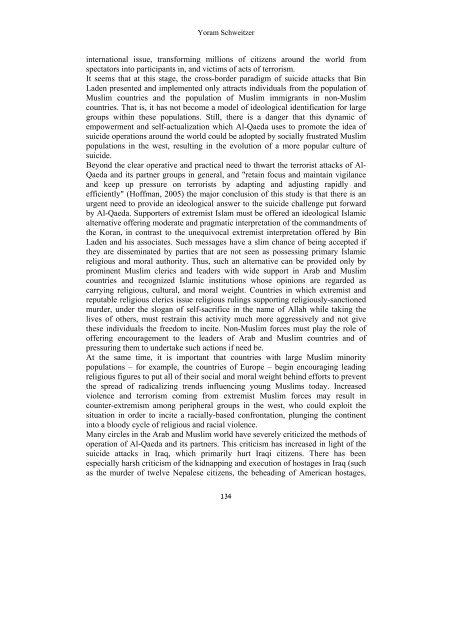222467to222472
222467to222472
222467to222472
Create successful ePaper yourself
Turn your PDF publications into a flip-book with our unique Google optimized e-Paper software.
Yoram Schweitzer<br />
international issue, transforming millions of citizens around the world from<br />
spectators into participants in, and victims of acts of terrorism.<br />
It seems that at this stage, the cross-border paradigm of suicide attacks that Bin<br />
Laden presented and implemented only attracts individuals from the population of<br />
Muslim countries and the population of Muslim immigrants in non-Muslim<br />
countries. That is, it has not become a model of ideological identification for large<br />
groups within these populations. Still, there is a danger that this dynamic of<br />
empowerment and self-actualization which Al-Qaeda uses to promote the idea of<br />
suicide operations around the world could be adopted by socially frustrated Muslim<br />
populations in the west, resulting in the evolution of a more popular culture of<br />
suicide.<br />
Beyond the clear operative and practical need to thwart the terrorist attacks of Al-<br />
Qaeda and its partner groups in general, and "retain focus and maintain vigilance<br />
and keep up pressure on terrorists by adapting and adjusting rapidly and<br />
efficiently" (Hoffman, 2005) the major conclusion of this study is that there is an<br />
urgent need to provide an ideological answer to the suicide challenge put forward<br />
by Al-Qaeda. Supporters of extremist Islam must be offered an ideological Islamic<br />
alternative offering moderate and pragmatic interpretation of the commandments of<br />
the Koran, in contrast to the unequivocal extremist interpretation offered by Bin<br />
Laden and his associates. Such messages have a slim chance of being accepted if<br />
they are disseminated by parties that are not seen as possessing primary Islamic<br />
religious and moral authority. Thus, such an alternative can be provided only by<br />
prominent Muslim clerics and leaders with wide support in Arab and Muslim<br />
countries and recognized Islamic institutions whose opinions are regarded as<br />
carrying religious, cultural, and moral weight. Countries in which extremist and<br />
reputable religious clerics issue religious rulings supporting religiously-sanctioned<br />
murder, under the slogan of self-sacrifice in the name of Allah while taking the<br />
lives of others, must restrain this activity much more aggressively and not give<br />
these individuals the freedom to incite. Non-Muslim forces must play the role of<br />
offering encouragement to the leaders of Arab and Muslim countries and of<br />
pressuring them to undertake such actions if need be.<br />
At the same time, it is important that countries with large Muslim minority<br />
populations – for example, the countries of Europe – begin encouraging leading<br />
religious figures to put all of their social and moral weight behind efforts to prevent<br />
the spread of radicalizing trends influencing young Muslims today. Increased<br />
violence and terrorism coming from extremist Muslim forces may result in<br />
counter-extremism among peripheral groups in the west, who could exploit the<br />
situation in order to incite a racially-based confrontation, plunging the continent<br />
into a bloody cycle of religious and racial violence.<br />
Many circles in the Arab and Muslim world have severely criticized the methods of<br />
operation of Al-Qaeda and its partners. This criticism has increased in light of the<br />
suicide attacks in Iraq, which primarily hurt Iraqi citizens. There has been<br />
especially harsh criticism of the kidnapping and execution of hostages in Iraq (such<br />
as the murder of twelve Nepalese citizens, the beheading of American hostages,<br />
134


